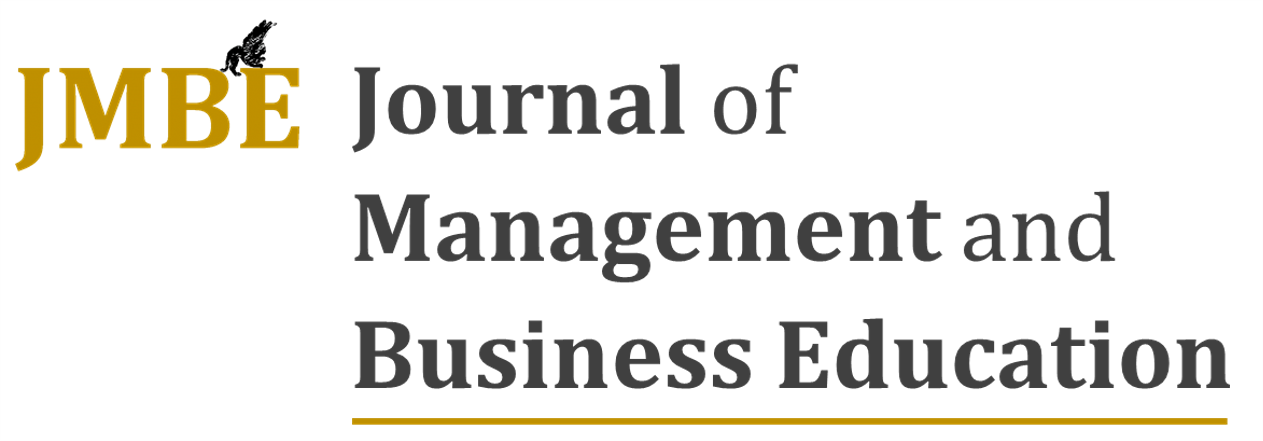Competency assessment in business studies
DOI:
https://doi.org/10.35564/jmbe.2019.0001Keywords:
competencies, higher education, business studies, bibliometric analysis, Web of ScienceAbstract
This editorial highlights the research on competency assessment in Higher Education of Business studies. For this, a bibliometric study is provided about the general research on competencies in higher education, and the research on competency assessment, to highlights the importance of the study of the implementation and development of competencies, but also, the processes and methodologies that allow controlling and evaluating its achievement by university students. This analysis connects with some of the works collected in this and other issues of the Journal of Management and Business Education (JMBE), and opens the doors to researchers in this field to disseminate their work. Finally, the fourth issue of the journal is introduced, and sincere thanks are offered to those who have collaborated in its first steps.
Downloads
References
Artemeva, N., & Fox, J. (2010). Awareness versus production: Probing students' antecedent genre knowledge. Journal of Business and Technical Communication, 24(4), 476-515.
https://doi.org/10.1177/1050651910371302
Bredillet, C., Tywoniak, S., & Dwivedula, R. (2015). What is a good project manager? An Aristotelian perspective. International Journal of Project Management, 33(2), 254-266.
https://doi.org/10.1016/j.ijproman.2014.04.001
Gallon, M. R., Stillman, H. M., & Coates, D. (1995). Putting core competency thinking into practice. Research-Technology Management, 38(3), 20-28.
https://doi.org/10.1080/08956308.1995.11674264
Hagan, C. M., Konopaske, R., Bernardin, H. J., & Tyler, C. L. (2006). Predicting assessment center performance with 360‐degree, top‐down, and customer‐based competency assessments. Human Resource Management: Published in Cooperation with the School of Business Administration, The University of Michigan and in alliance with the Society of Human Resources Management, 45(3), 357-390.
https://doi.org/10.1002/hrm.20117
Kanter, R. M. (2006). Innovation: the classic traps. Harvard business review, 84(11), 72-83.
Lievens, F., & Sackett, P. R. (2012). The validity of interpersonal skills assessment via situational judgment tests for predicting academic success and job performance. Journal of Applied Psychology, 97(2), 460.
https://doi.org/10.1037/a0025741
Liu, P., & Wu, X. (2012). A competency evaluation method of human resources managers based on multi-granularity linguistic variables and VIKOR method. Technological and economic development of economy, 18(4), 696-710.
https://doi.org/10.3846/20294913.2012.753169
Min, J. C. (2012). A short-form measure for assessment of emotional intelligence for tour guides: Development and evaluation. Tourism Management, 33(1), 155-167.
https://doi.org/10.1016/j.tourman.2011.02.014
Olson‐Buchanan, J. B., Drasgow, F., Moberg, P. J., Mead, A. D., Keenan, P. A., & Donovan, M. A. (1998). Interactive video assessment of conflict resolution skills. Personnel Psychology, 51(1), 1-24.
https://doi.org/10.1111/j.1744-6570.1998.tb00714.x
Solansky, S. T. (2010). The evaluation of two key leadership development program components: Leadership skills assessment and leadership mentoring. The Leadership Quarterly, 21(4), 675-681.
Downloads
Published
How to Cite
Issue
Section
License
Copyright (c) 2023 Journal of Management and Business Education

This work is licensed under a Creative Commons Attribution-NonCommercial-ShareAlike 4.0 International License.
License terms at: https://creativecommons.org/licenses/by-nc/4.0/legalcode




